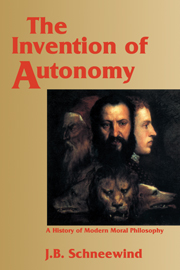Book contents
- Frontmatter
- Contents
- Preface
- Acknowledgments
- A note on references and abbreviations
- Introduction
- Part I The rise and fall of modern natural law
- 2 Natural law: From intellectualism to voluntarism
- 3 Setting religion aside: Republicanism and skepticism
- 4 Natural law restated: Suarez and Grotius
- 5 Grotianism at the limit: Hobbes
- 6 A morality of love: Cumberland
- 7 The central synthesis: Pufendorf
- 8 The collapse of modern natural law: Locke and Thomasius
- Part II Perfectionism and rationality
- Part III Toward a world on its own
- Part IV Autonomy and divine order
- Epilogue
- Bibliography
- Index of names
- Index of subjects
- Index of biblical citations
4 - Natural law restated: Suarez and Grotius
Published online by Cambridge University Press: 05 June 2012
- Frontmatter
- Contents
- Preface
- Acknowledgments
- A note on references and abbreviations
- Introduction
- Part I The rise and fall of modern natural law
- 2 Natural law: From intellectualism to voluntarism
- 3 Setting religion aside: Republicanism and skepticism
- 4 Natural law restated: Suarez and Grotius
- 5 Grotianism at the limit: Hobbes
- 6 A morality of love: Cumberland
- 7 The central synthesis: Pufendorf
- 8 The collapse of modern natural law: Locke and Thomasius
- Part II Perfectionism and rationality
- Part III Toward a world on its own
- Part IV Autonomy and divine order
- Epilogue
- Bibliography
- Index of names
- Index of subjects
- Index of biblical citations
Summary
In rejecting natural law theory, Montaigne was rejecting the dominant European understanding of universal morality. During the fifteenth and sixteenth centuries all the universities taught their students the basic points of the theory; and it was important outside the academy as well. In 1594 the Protestant Richard Hooker produced a magnificent restatement of Thomistic natural law doctrine in order to justify, against Catholics and Calvinists, his claim that the English government could rightly determine what its churches taught and how they were to be organized. Sixteenth-century Spanish Catholic theologians were prolific sources of commentary on both intellectualist and voluntarist theories of natural law. Their greatest successor was Francisco Suarez, whose early seventeenth-century synthesis was designed to support his efforts to justify papal supremacy over all baptized Christians, including such heretics as King James I, and to defend tyrannicide. Hooker addressed a local issue and was influential only in England. Suarez spoke to problems of international order, and was read everywhere.
Hooker restated the Thomistic belief that under a divine supervisor all things follow laws directing them to act for the common good of the universe as well as their own, and that natural law directs us in particular to both ends equally. Quietly incorporating some elements of voluntarism, he tried to make his position acceptable to Calvinists as well as to members of his own church.
- Type
- Chapter
- Information
- The Invention of AutonomyA History of Modern Moral Philosophy, pp. 58 - 81Publisher: Cambridge University PressPrint publication year: 1997



